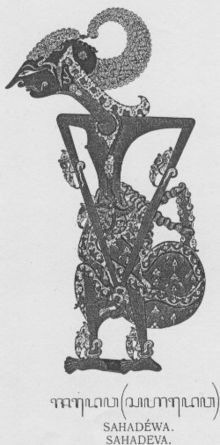偕天
| 偕天 | |
|---|---|
 印度尼西亚哇扬皮影偶戏中的偕天 | |
| 角色设定信息 | |
| 家人 | 般度(父)[注 1] 玛德利(母) 坚战、怖军、阿周那、无种(兄弟) |
偕天(梵语:सहदेव,IAST:Sahadeva),印度古代史诗《摩诃婆罗多》人物。他是般度族五子中最小的一位,为般度的第二位妻子玛德利召唤双马童所生,与第四子无种为双胞胎兄弟。
词源与别名
梵语中,“偕天”一词由“सह”(saha,意为“偕同”)与“देव”(deva,意为“神”)组合而来,意为“偕同天神”。无种和偕天两人皆由玛德利使用贡蒂的咒语召唤双马童所得来。因此,两人常被称为“双马童之子”(आश्विनेय)[1][2]。
传说
早年
偕天之父般度遭紧陀摩仙人诅咒,无法与女性交欢;为避免绝嗣,其妻贡蒂使用从敝衣仙人处学得的神术向神明求子,并教给第二位妻子玛德利。玛德利向双马童求得二子,第二子便是偕天。之后,俱卢族与般度族跟从德罗纳接受训练[3]。
在般度族五人娶得黑公主后,每人都与黑公主育有一子,其中偕天之子名为闻军(श्रुतसेन,Śrutasena)[4]。
在般度族与俱卢族的骰子赌局中,般度族最终满盘皆输,导致五人被流放十三年,其中一年须隐姓埋名。偕天发誓要亲手击败骰子赌局的始作俑者沙恭尼。在第十三年,偕天乔装打扮为吠舍牧牛人,在摩蹉国照看牛群[5]。
俱卢之战
战前,偕天希望由摩蹉国国王毗罗吒担任般度一方主帅,但长兄坚战提名猛光[6]。为期十八天的俱卢之战中,偕天驾驶的战车旗帜上的图样为银色天鹅。他击败了敌方多名参战者,其中有难敌的四十位兄弟、沙恭尼以及沙利耶之子[7][8]。战后,偕天被封为摩德罗国国王[9]。
逝世
注释
- ^ 般度为其名义上的父亲,而其真正的父亲应是双马童。
参考文献
- ^ Vyasa. Mahabharata: The great hall. Book two. NYU Press. 2006: 225 [2018-08-29]. ISBN 0814794068. (原始内容存档于2020-04-27).
- ^ Gopal, Madan. K.S. Gautam , 编. India through the ages. Publication Division, Ministry of Information and Broadcasting, Government of India. 1990: 73.
- ^ Pattanaik, Devdutt. 19. Jaya: An Illustrated Retelling of the Mahabharata. Penguin Books India. 2010-01-01: 59. ISBN 9780143104254 (英语).
- ^ Parmeshwaranand, Swami. Encyclopaedic dictionary of Purāṇas 1st. New Delhi: Sarup & Sons. 2001. ISBN 9788176252263.
- ^ Subodh Kapoor (编). The Indian encyclopaedia : biographical, historical, religious, administrative, ethnological, commercial and scientific 1st. New Delhi: Cosmo Publications. 2002: 4462. ISBN 9788177552713.
- ^ Menon, [translated by] Ramesh. The Mahabharata : a modern rendering 2. iUniverse, Inc. 2006: 87 [2018-08-30]. ISBN 9780595401888. (原始内容存档于2018-08-30).
- ^ The Ramayana and Mahabharata: Book IX: Fall of Drona. [2018-08-29]. (原始内容存档于2018-08-16).
- ^ Subodh Kapoor (编). The Indian encyclopaedia : biographical, historical, religious, administrative, ethnological, commercial and scientific 1st. New Delhi: Cosmo Publications. 2002: 4462. ISBN 9788177552713.
- ^ The Mahabharata, Book 12: Santi Parva: Rajadharmanusasana Parva: Section XLII. [2018-08-29]. (原始内容存档于2018-02-02).
- ^ The Mahabharata, Book 17: Mahaprasthanika Parva: Section 2. [2018-08-29]. (原始内容存档于2018-02-25).
| ||||||||||||||||||||||||
Text is available under the CC BY-SA 4.0 license; additional terms may apply.
Images, videos and audio are available under their respective licenses.

